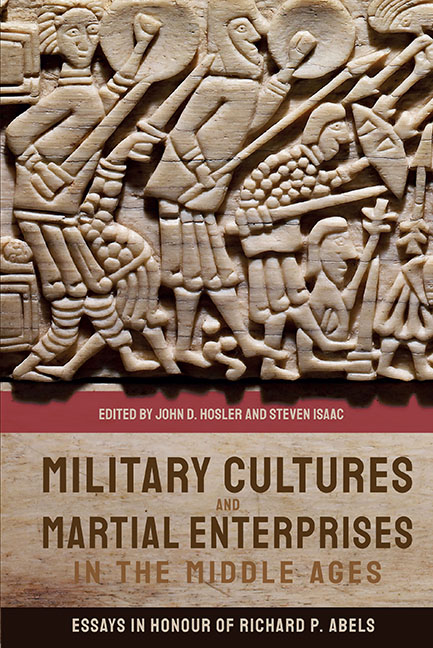Book contents
- Frontmatter
- Contents
- List of Illustrations
- Notes on Contributors
- Introduction and Appreciation
- 1 Charlemagne’s Invasion of Spain in 778: The Anatomy of a Strategic Failure and its Impact
- 2 Military Intelligence and Strategic Planning Under the Ottonian Kings of Germany, 919–1024
- 3 Ain’t Nobody Here But Us Chickens: Defeated Warriors, Masculinity, and Mistaken Identity in Western Europe, 679–1141
- 4 Count Baldwin V of Flanders: Broker of Eleventh-Century Power
- 5 Kings and Fortuna: The Meanings of Brémule
- 6 Fighting the Last War: Remembering the Norman Conquest during the Anarchy
- 7 Gilbert of Mons’ Chronicle of Hainaut as a Source for Military History in the Twelfth Century
- 8 At Home with Roger of Howden
- 9 Embedded Reporters? Ambroise, Richard de Templo, and Roger of Howden on the Third Crusade
- 10 The Treatment of Male and Female Prisoners of War during the Third Crusade
- 11 Exempla, Crusade, and Chivalry
- 12 Frontier Warfare in the St Omer Chronicle
- 13 Some Observations on the Training of Medieval Warhorses
- Richard P. Abels’ Curriculum Vitae
- Index
- Tabula Gratulatoria
5 - Kings and Fortuna: The Meanings of Brémule
Published online by Cambridge University Press: 21 October 2020
- Frontmatter
- Contents
- List of Illustrations
- Notes on Contributors
- Introduction and Appreciation
- 1 Charlemagne’s Invasion of Spain in 778: The Anatomy of a Strategic Failure and its Impact
- 2 Military Intelligence and Strategic Planning Under the Ottonian Kings of Germany, 919–1024
- 3 Ain’t Nobody Here But Us Chickens: Defeated Warriors, Masculinity, and Mistaken Identity in Western Europe, 679–1141
- 4 Count Baldwin V of Flanders: Broker of Eleventh-Century Power
- 5 Kings and Fortuna: The Meanings of Brémule
- 6 Fighting the Last War: Remembering the Norman Conquest during the Anarchy
- 7 Gilbert of Mons’ Chronicle of Hainaut as a Source for Military History in the Twelfth Century
- 8 At Home with Roger of Howden
- 9 Embedded Reporters? Ambroise, Richard de Templo, and Roger of Howden on the Third Crusade
- 10 The Treatment of Male and Female Prisoners of War during the Third Crusade
- 11 Exempla, Crusade, and Chivalry
- 12 Frontier Warfare in the St Omer Chronicle
- 13 Some Observations on the Training of Medieval Warhorses
- Richard P. Abels’ Curriculum Vitae
- Index
- Tabula Gratulatoria
Summary
THE TWENTIETH DAY of August 2019 marked the 900th anniversary of the Battle of Brémule, when an army under the command of King Henry I of England defeated an army under the command of King Louis VI of France, one of the relatively rare high medieval battles where reigning kings fought each other directly. The fortunate coincidence (for me) of this anniversary with the opportunity to contribute to a Festschrift for my friend and longtime colleague in medieval military history, Richard Abels, gives me the chance to reexamine the battle for the first time since I wrote a short section about it in my book Warfare under the Anglo-Norman Kings, which was published in 1994, though that section (and much of the rest of the book) was actually written in 1982, the delay being a result of the vagaries of academic hiring in the early 1980s, an environment Richard, myself, and many others in this volume, all endured. During that almost forty-year gap since I last thought closely about Brémule, the profession of history has changed pretty significantly, especially in terms of the rise of various forms of cultural history embodied in what has come to be known as The Cultural Turn (though “Cultural Turns” is probably the more accurate characterization of the proliferation of self-conscious “turns” the profession has witnessed since the mid-1990s). Richard and I have talked extensively and collaborated on applying aspects of these turns to medieval military history, especially in putting the analysis of culture more centrally into the interpretation of military activity in the Middle Ages.
Thus, happy coincidence leads me to reconsider Brémule in some particular ways. This chapter focuses not so much on what the battle can tell us about twelfth-century military practice, as it turns out that the conclusions we can draw about Brémule from the traditional “what happened?” perspective of political, military, and even social history, have not changed much in forty years. Rather, it reexamines the battle in terms of its rhetorical presentation in the primary sources that describe it, using that reexamination for a deeper look at the newer cultural history question, “What did it mean?”
- Type
- Chapter
- Information
- Military Cultures and Martial Enterprises in the Middle AgesEssays in Honour of Richard P. Abels, pp. 99 - 116Publisher: Boydell & BrewerPrint publication year: 2020

